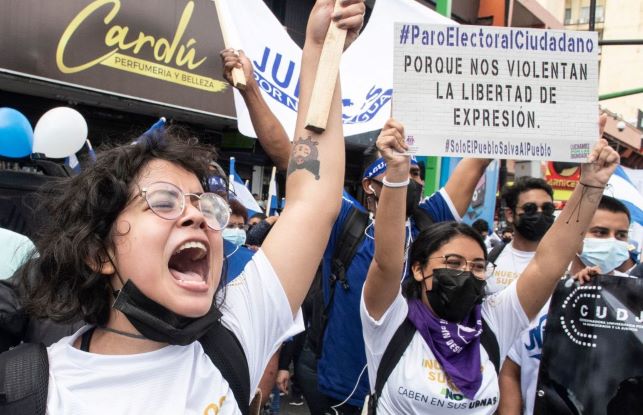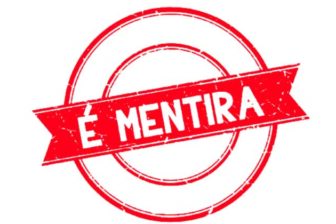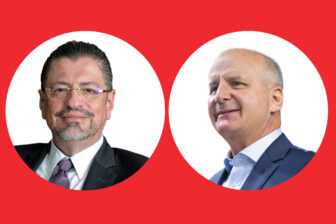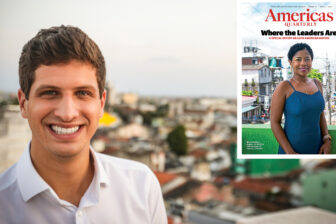After jailing opposition leaders, silencing independent media and harshly criminalizing dissent, President Daniel Ortega secured a fourth consecutive term as Nicaragua’s president on November 7, garnering messages of support from Venezuela, Russia, Bolivia and Cuba.
Positioning on the recent Nicaraguan elections has become something of an ideological litmus test for political groups across Latin America. While many Latin American governments were quick to decry the illegitimacy of the Ortega-Murillo victory, leftist parties throughout the region struggled to unite under a common message, leading to internal divisions and contradictory statements.
AQ compiled statements or comments issued by current government officials and presidential hopefuls across the region:
WHO CONDEMNED:
ARGENTINA
Opposition Coalition: The Nicaraguan election was “an illegitimate and antidemocratic parody,” and the Argentine government should stand firmly against the “dictators Ortega and Murillo.”
CHILE
Ministry of Foreign Affairs: Nicaraguan election results “lacked all of the conditions to be considered valid and transparent,” serving only to “eternalize Daniel Ortega and Rosario Murillo[’s] dictatorial regime.”
Gabriel Boric, presidential candidate: “I have no doubt the Ortega-Murillo staging in Nicaragua is a farce,” Boric stated, offering his solidarity to opposition leaders and the Nicaraguan people.
José Antonio Kast, presidential candidate: The Nicaraguan elections were “neither free nor competitive,” Kast said, accusing the Chilean Communist Party and Boric of “defend[ing] and protect[ing] Ortega, the Dictator of Nicaragua.”
COLOMBIA
Iván Duque, President of Colombia: “I say it without any fear, Colombia is not going to recognize the result of these fraudulent elections”, which were nothing more than “a chronicle of an announced fraud” that should be taken up by the Organization of American States via a “clear and unequivocal statement from all countries… that are defenders of democracy.”
Gustavo Petro, presidential candidate: “Ortega transformed the Sandinista revolution into a banana dictatorship. Nicaragua shows us how the old progressivisms have degraded and do not respond to the present needs of the peoples.”
Sergio Fajardo, presidential candidate: “Nicaragua is not a democracy, there were not elections, nor is it a triumph.” Fajardo described Nicaragua as “a frustrated dream: Many of us supported the fight against Somoza” and ended up with “Ortega, another dictator.”
COSTA RICA
Office of the President: “Does not recognize the electoral process in Nicaragua” due to the absence of “conditions and guarantees required in a democracy to prove that elections are transparent, credible, independent, free, fair and inclusive.”
ECUADOR
Ministry of Foreign Relations and Human Mobility: “Rejects the results of the Nicaraguan electoral process,” jointly “condemning the persecution and repression of opposition leaders, civil society, and media, and call[ing] on the international community to work together in the reestablishment of democracy in Nicaragua.”
GUATEMALA
Ministry of Foreign Relations: “Expresses concern” regarding the electoral process in Nicaragua and “laments that the conditions for free and fair elections, based on universal and secret suffrage as an expression of the sovereignty of the people, have not been met.”
PANAMA
Ministry of Foreign Relations: “Rejects the exclusionary conditions of the [Nicaraguan] electoral process, as well as the systematic violations of human rights and the arrests of leaders… of the opposition and of Nicaraguan social movements.”
PERU
Ministry of Foreign Affairs: Nicaraguan elections “did not meet minimum criteria for free elections” and “deserved international rejection.”
URUGUAY
Ministry of Foreign Relations: Electoral process in Nicaragua “lacked legitimacy,” with the government “violating the guarantees of transparency, inclusion and verification, essential to any democratic process.”
FORMER PRESIDENTS
Twenty-two former heads of state, including Argentina’s Mauricio Macri; Bolivia’s Carlos Mesa; Colombia’s Álvaro Uribe and Andrés Pastrana; Costa Rica’s Laura Chinchilla, Luis Guillermo Solís, Oscar Arias and Rafael Ángel Calderón; Ecuador’s Osvaldo Hurtado and Jamil Mahuad; Mexico’s Felipe Calderón and Vicente Fox; and Panama’s Mireya Moscoso: Declared Nicaraguan elections an “electoral farce,” comparable to the Venezuelan government, and request “necessary and effective actions to sustain democratic security in the region.”
WHO SUPPORTED:
BOLIVIA
Ministry of Foreign Affairs: Applauded Nicaraguan “participation and democratic vocation in the electoral process,” affirming a “strengthening of democracy” and the “full exercise of sovereignty.”
BRAZIL
Opposition Workers’ Party (PT) – Election was “a great popular and democratic manifestation… with the main objective of constructing a more socially just and egalitarian country,” the party said in a statement. Party chief Gleisi Hoffman said later that statement had not been approved by party leadership, but she did not condemn it either. On Twitter, Hoffman said the “PT’s position in relation to any country is the defense of the self-determination of peoples, against external interference and respect for democracy, by the government and opposition.”
CUBA
Miguel Díaz-Canel, President of Cuba: Praised the “demonstration of sovereignty and civility in the face of a cruel media campaign.”
VENEZUELA
Nicolás Maduro, President of Venezuela: “It is a great victory, a victory for the people, a victory for a country, which has a present, has a future, has a great past. Our congratulations… congratulations and admiration to Nicaragua that is always free.”
WHO SOUGHT MIDDLE GROUND:
ARGENTINA
Ministry of Foreign Relations: “Reiterates their concern regarding the arrest of opposition leaders” while maintaining a policy of “non-interference” and solidarity with the Nicaraguan people.
BRAZIL
Brazil’s federal government: Until publication, no statements were found from the Ministry of External Relations or the office of President Jair Bolsonaro.
MEXICO
Mexico’s Foreign Ministry: No comment until “after official results are posted”.
—
González Camaño and Cohen are editorial assistants at AQ.









